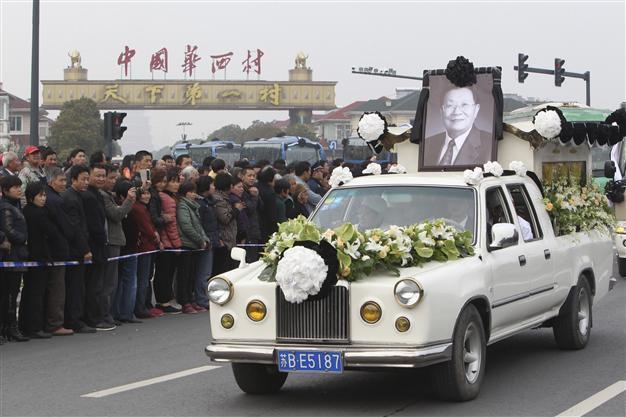Funeral for leader of China's 'richest village'
HUAXI - Agence France-Presse

A limousine carrying Wu Renbao's coffin drives out of Huaxi village, one of China's most prosperous villages, in Jiangyin city, in eastern China's Jiangsu province, Friday March 22, 2013. AP photo
Residents of China's "richest village", Huaxi, on Friday bid farewell to the man who made them wealthy by transforming a rural settlement into a socialist paradise.
Wu Renbao, the retired Communist Party chief of the village in the eastern province of Jiangsu, died on Monday of cancer at age 84 and was laid to rest at a funeral ceremony. Beneath a huge photograph of the late leader, hundreds of mourners wearing black armbands and white cloth flowers bowed their heads in silence.
"He will be in our hearts forever," one villager said with tears in her eyes.
The story of Huaxi is a model for Chinese propaganda, showing how a village could get rich under economic reforms launched three decades ago, but stay true to socialist ideals by sharing the wealth.
The village's 2,000 registered residents live in villas and drive luxury cars bought with profits from collectively-owned companies, state media said.
But some are more equal than others and the 33,000 people who live in Huaxi while deemed non-residents do not enjoy the same benefits.
Wu assumed mythical status, meeting top leaders and starring as himself in a 2012 film made to mark a key communist party meeting.
After his death, state media reported incorrectly that the US news magazine "Time" had once put him on the cover.
Wu was in charge for more than four decades, turning farmers into millionaires by setting up 12 corporations ranging from textiles to steel. "My biggest wish is to make poor people live a good life. Communists should seek happiness for the majority of the people," Wu once said, as quoted by the official Xinhua news agency.
Official figures are scarce, but the village -- which proclaims itself China's richest -- said its businesses had total sales turnover of 50 billion yuan ($7.9 billion) in 2008.
But extravagant displays of wealth and accusations of nepotism have called the model village into question, the China Daily said.
In 2011, Huaxi unveiled one of China's tallest buildings, a 74-storey hotel towering 328 metres (1,080 feet) high which cost $470 million to build and contains a supposedly solid gold statue of an ox.
One of Wu's four sons took over as party chief in 2003, and a magazine has claimed his family controls more than 90 percent of the village's assets.
